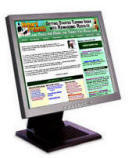The Writing
and submission of articles is a proven marketing method that can
send more targeted visitors to your website, enhance your web presence, increase your
page rankings, and increase your conversions.
|
Article Writing for the
Terrified Potential Author
|
Although it doesn't need to be, it can be an intimidating challenge to
those who remember the forced essay writing assignments from high school or university
days.
Those memories can take time to
fade away - but after learning a few basic and
simple steps,
you'll find writing your own articles isn't as daunting as it appears.
 Many new writers struggle finding ideas to
write about. Even experienced authors can encounter the pain of
temporary 'Writer's Block'
Many new writers struggle finding ideas to
write about. Even experienced authors can encounter the pain of
temporary 'Writer's Block'
The easiest way to overcome these problems is to write about things you
are interested in and preferably passionate about.
You already have knowledge in these areas that can be shared with
others and committing your expertise to paper or a webpage presents
you as an authority on the subject.
It's not uncommon to under-estimate your own abilities in areas where you have
experience.
The level of questions posed by beginners and novices is often
very surprising because we take for granted the knowledge we have
gained and sometimes lose sight of the challenge to learn faced by
the un-informed. (but we know that there is no
such thing as a stupid question).
Once you decide on a general area, a good way to narrow
your topic down is to focus on the problems that people have and
prepare to write an article with solutions to those problems.
|
|
- - - - - - - -
-

People read articles because they want to be
entertained or they want information
to solve their problems.
Writing entertaining
articles isn't necessarily easy. However,
writing information articles can be as simple as sharing tips
that you have already learned. Readers are looking for "What's in it for
them - what can they learn from your experience?"
If you don't already know the most common problems people have in
your
particular field, a good source of information is to
visit and participate in related online forums and note the most common questions
asked.
If you don't have all the answers you can get them through the
Search engines. This is obviously something readers could do for themselves. However,
you are adding the value of your knowledge and the convenience
of providing a range of
well thought out answers in a single document.
- - - - - - - -
-
Not many people care to read long documents on their computer
monitors, so
unlike long essays, articles around 400 words long are preferred.
By breaking an article into an introduction, a few
sub-headings and a conclusion you may only have to write
50 or so words in each section.
The sub-headings provide another benefit by breaking
up a webpage and opening up the white space around the content.

The first draft should be your
worksheet .
Don't try to
produce a final copy as you write. It tends to be much quicker
if you get your thoughts down first and come back to edit.
You'll find that your thoughts flow much more freely if you
don't hamper the flow with all of those rules you learned in
school. Time for them later.
The final
step, and one that is vitally important, is to proofread your article making
sure that the writing flows and would be interesting to the
reader. Ask yourself if the article provides information the
potential reader is looking for. It can also be helpful to have
one or more other people proof read the article.
This is also the time to
remove spelling and grammatical errors. Use your Spell
Checker and seek qualified help if you are uncertain about your
grammar. Poor grammar distracts readers and can lead them to
lower their perception of your article's value and possibly your
qualifications.
- - - - - - - -
-
If you still have problems writing you may want to do a search
for 'article writing software'. There are many packages around
that might make the process easier for you. Keep in mind that some of
these software have a fairly steep learning curve and high cost.
Similarly, there are numerous
e-books available on the topic and many of them are available
for free.

When you've written your article you may want to add it to
your own website, newsletter or blog. If you do, Search engines
will love it because
of its original content.
If you add an 'About the Author' section
with a link to your website, you can also submit it to article
directories.
As other websites publish your article you receive another thing
that search engines look for to improve your page rank, they are
valuable one-way back links.
- - - - - - - -
-
 Article
submission can be a tedious process, but software and websites
that submit to multiple directories exist to make
the job much easier. Do a little research here to select the
most appropriate and popular article directories. Article
submission can be a tedious process, but software and websites
that submit to multiple directories exist to make
the job much easier. Do a little research here to select the
most appropriate and popular article directories.
After writing your first few articles you'll find it wasn't as
daunting as it first appeared. And it can become a rewarding and
fun filled experience - especially after submitting your
articles to the
popular directories and reading them as they are
picked up and republished on other websites.
(Google will find
them for you).
| About the Author -
Richard Rossbauer has been writing about Niche
Marketing, helping others create a rewarding web presence,
and Online security for the past 10 years. His
www.RichardPresents.com website also offers tips and
tools for doing fun things like family gardening, camping,
cooking, bird watching, and other fun and entertaining
activities |
These helpful articles
may be copied as long as the content and the author's bio
are not altered, and the link to his website remains active.
|
|
|